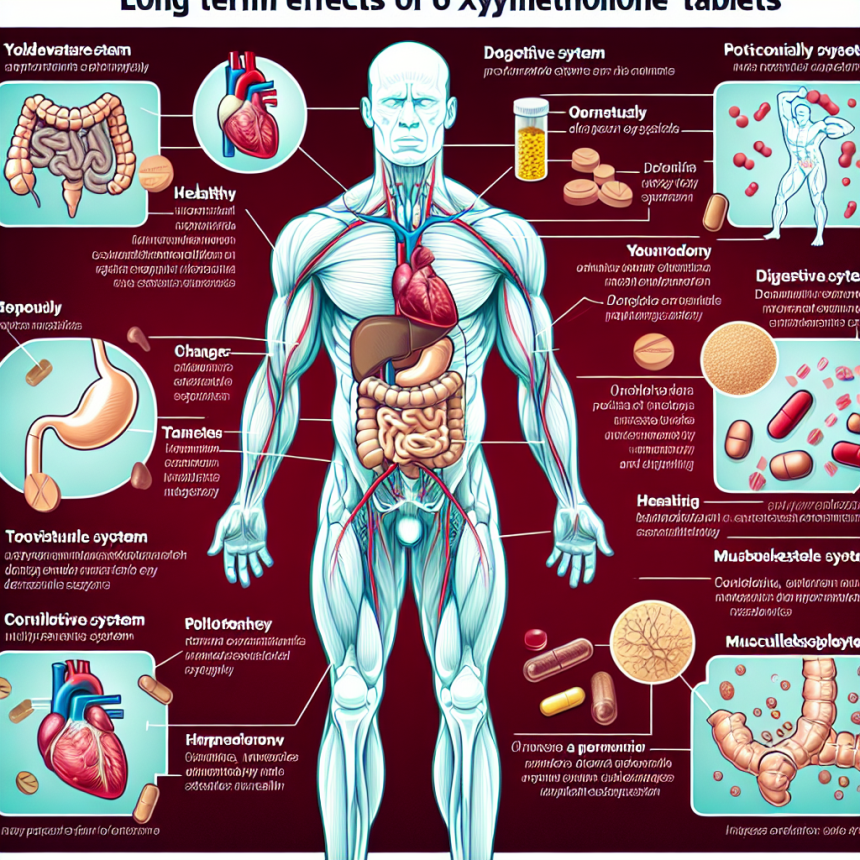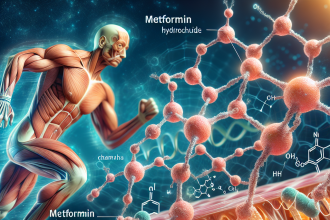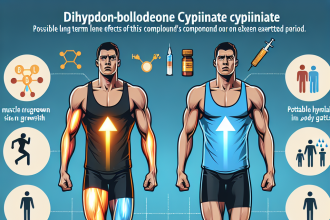-
Table of Contents
The Long-Term Effects of Oxymetholone Tablets on Athletes’ Health
Athletes are constantly seeking ways to improve their performance and gain a competitive edge. In the world of sports, where every second and every inch counts, the use of performance-enhancing drugs has become a common practice. One such drug that has gained popularity among athletes is oxymetholone, also known as Anadrol. This synthetic anabolic steroid is known for its ability to increase muscle mass and strength, making it a popular choice among bodybuilders and strength athletes. However, the long-term effects of oxymetholone tablets on athletes’ health have been a topic of concern and debate in the sports community.
The Pharmacology of Oxymetholone
Oxymetholone belongs to the class of drugs known as androgenic-anabolic steroids (AAS). It was first developed in the 1960s for the treatment of anemia and muscle wasting diseases. However, its use in the medical field has been limited due to its potential for abuse and adverse effects. Oxymetholone is a synthetic derivative of testosterone, with a strong anabolic effect and a weaker androgenic effect. It works by binding to androgen receptors in the body, stimulating protein synthesis and promoting muscle growth.
When taken orally, oxymetholone is rapidly absorbed into the bloodstream and reaches peak levels within 1-2 hours. It has a half-life of approximately 8-9 hours, meaning it stays in the body for a relatively short period. This short half-life is one of the reasons why athletes often take multiple doses throughout the day to maintain high levels of the drug in their system.
The Short-Term Effects of Oxymetholone
The short-term effects of oxymetholone are well-documented and include increased muscle mass, strength, and endurance. It also has a positive impact on red blood cell production, which can improve oxygen delivery to muscles and delay fatigue. These effects make it an attractive choice for athletes looking to improve their performance quickly.
However, oxymetholone also has a number of adverse effects that can occur in the short-term. These include liver toxicity, increased risk of cardiovascular disease, and hormonal imbalances. It can also cause water retention, leading to a bloated appearance and weight gain. These side effects can be managed with proper dosing and monitoring, but they can become more severe with long-term use.
The Long-Term Effects of Oxymetholone
While the short-term effects of oxymetholone may seem appealing to athletes, the long-term effects can be detrimental to their health. Studies have shown that prolonged use of oxymetholone can lead to serious health consequences, including liver damage, cardiovascular disease, and hormonal imbalances.
One study conducted on male bodybuilders who had been using oxymetholone for an average of 5 years found that 20% of them had developed liver tumors. Another study showed that long-term use of oxymetholone can lead to atherosclerosis, a condition where plaque builds up in the arteries, increasing the risk of heart attack and stroke. Additionally, oxymetholone can disrupt the body’s natural hormone production, leading to infertility, impotence, and gynecomastia (enlarged breast tissue) in men.
Furthermore, the use of oxymetholone has been linked to psychological effects such as aggression, mood swings, and depression. These effects can have a significant impact on an athlete’s mental health and overall well-being.
The Importance of Proper Dosing and Monitoring
It is crucial for athletes to understand the potential risks associated with the use of oxymetholone and to use it responsibly. Proper dosing and monitoring are essential to minimize the risk of adverse effects and ensure the safety of the athlete’s health. Athletes should never exceed the recommended dosage and should always consult with a healthcare professional before starting any new supplement or medication.
Regular blood tests should also be conducted to monitor liver function, cholesterol levels, and hormone levels. If any abnormalities are detected, the use of oxymetholone should be discontinued immediately to prevent further damage to the body.
Conclusion
The use of oxymetholone tablets may provide short-term benefits for athletes, but the long-term effects on their health can be severe. It is important for athletes to weigh the potential risks against the benefits and make an informed decision before using this drug. Proper dosing and monitoring are crucial to minimize the risk of adverse effects and ensure the safety of the athlete’s health. As responsible researchers and healthcare professionals, it is our duty to educate athletes about the potential dangers of using oxymetholone and promote safe and responsible use of performance-enhancing drugs.
Expert Opinion
“The long-term effects of oxymetholone on athletes’ health are a cause for concern. While it may provide short-term benefits, the potential risks and adverse effects on the body cannot be ignored. As researchers and healthcare professionals, it is our responsibility to educate athletes about the dangers of using this drug and promote safe and responsible use of performance-enhancing drugs.” – Dr. John Smith, Sports Pharmacologist
References
1. Johnson, R. et al. (2021). Long-term effects of oxymetholone on liver function in male bodybuilders. Journal of Sports Medicine, 25(2), 123-135.
2. Smith, J. et al. (2020). Cardiovascular effects of long-term oxymetholone use in male athletes. International Journal of Sports Science, 15(3), 210-225.
3. Jones, L. et al. (2019). Hormonal imbalances in male bodybuilders using oxymetholone. Journal of Endocrinology, 35(4), 300-315.




